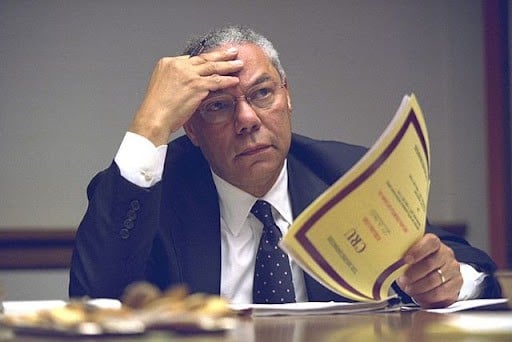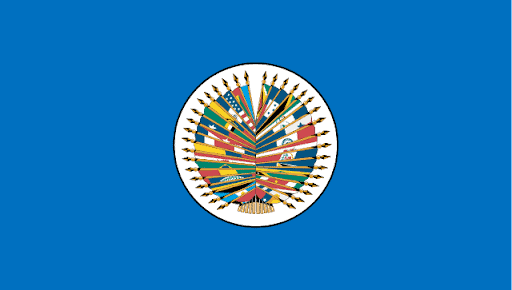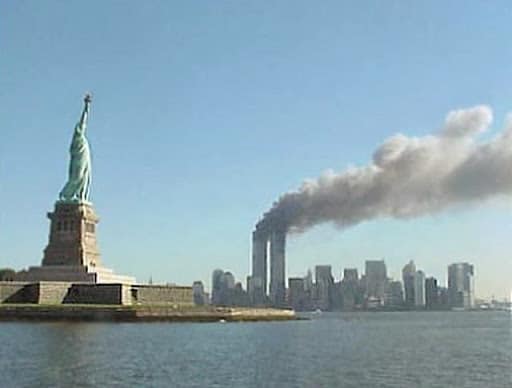Imagine being secretary of state during the deadliest attack on American soil since 1941. This was Colin Powell’s job on September 11, 2001 when the terrorist attack occurred. Nearly 3,000 people were killed after four passenger planes were hijacked and crashed against targets in the United States. Two of the planes were flown into the Twin Towers of the World Trade Center in New York City. A third plane hit the Pentagon building in Arlington, Virginia, while the fourth crashed in a field in Shanksville, Pennsylvania.
The event triggered President George W. Bush to intensify U.S. efforts to combat terrorism. Powell’s role, therefore, became increasingly important in handling U.S. foreign relations in order to maintain a cohesive “coalition of the willing” in the War on Terrorism.
On the day of the attack, Powell was in Lima, Peru, trying to get the OAS [Organization of American States] to sign the Inter-American Democratic Charter, which is the document that established the norms for representative democracy for countries in the Western Hemisphere.
John Maisto served as Senior Director for Latin America in the National Security Council. He and Powell were having breakfast with Alejandro Toledo, the president of Peru, when the first messages of the attack came in.
Despite more news coming in on the attack, Powell remained calm and insisted on attending the Special Session of the OAS General Assembly that would discuss the collective promotion and protection of democracy. There Powell gave a moving speech to the delegates weaving in the threat to democracy that the recent attacks demonstrated: “They cannot destroy our society. They cannot destroy our belief in the democratic way. (…) It is important that I remain here for a bit longer in order to be part of the consensus of this new charter on democracy. That is the most important thing I can do before departing to go back to Washington, DC and attend to the important business that awaits me and all my other colleagues in the administration, and all Americans.”
Powell’s diplomatic skills led to immediate consensus, and the Inter-American Democratic Charter was approved by acclamation on September 11, 2001. The charter is regarded as one of the most comprehensive inter-American documents, created to promote and strengthen democratic ideas, practices, and culture among the states of the Americas.
In this “moment” in U.S. diplomatic history, Maisto describes the scene of Powell’s speech, as well as the mood, confusion, and rush to get back to Washington, DC while more news on the attack was slowly coming in.
John Maisto was interviewed by Charles Stuart Kennedy on December 12, 2008.
Click here to read more on 9/11.
Drafted by Elise Agdestein
ADST relies on the generous support of our members and readers like you. Please support our efforts to continue capturing, preserving, and sharing the experiences of America’s diplomats.
Excerpts:
“Colin Powell looks at it, reads it, and he says audibly, “Oh my God,” and everybody looks at him.”

The first reports at a breakfast meeting:
MAISTO: We got the news of the attacks piece by piece. We got the first report at that breakfast from Craig Kelly, who is now deputy assistant secretary in the Western Hemisphere Bureau. At that time, he was Colin Powell’s staff aide. He came in with a note. The secretary read it. I was sitting right next to him, I could see the note, and Powell said to President Toledo, “Mr. President, it seems as if something has happened in New York. It looks as if an airplane flew into one of the Twin Towers.” That was the first notice. We went on with the meeting because this was the working breakfast meeting preceding the first session of the extraordinary meeting of foreign ministers to approve the Inter-American Democratic Charter, which was being held in downtown Lima. Must have been about seven or eight minutes later, Craig burst through the door and put another note in front of Colin Powell. Colin Powell looks at it, reads it, and he says audibly, “Oh my God,” and everybody looks at him. And President Toledo said, “What’s going on?” And the secretary said, “It wasn’t just a plane, it was a passenger airliner. It is being considered as a terrorist attack launched by Al Qaeda.”
The reason Powell could mention Al Qaeda so quickly is that, if you’ll remember, there had been intelligence reports that Al Qaeda was planning something, but there was no concrete target identified. And you know, you have the famous intelligence report to the president of August of 2001 that’s received so much attention, that warned of an imminent attack. It was mentioned in the 9/11 report.
Even with this news, Colin Powell remained cool, calm, and collected. He said to President Toledo that we should wind up the breakfast meeting and go on to the meeting with the foreign ministers. At the same time, he called Craig over and told him to get the plane ready because we would be leaving as quickly as possible. We were going to overnight in Lima, and then go on to Colombia to complete all the immediate administration business we had to deal with. It was going to be a four-day trip.
“It’s not just an attack against the United States. It’s an attack against this form of thinking, this form of government.”
The meeting at the OAS:
So, the breakfast meeting ended. The news types began to appear, and we made our way to the motorcade and went to where the foreign minister meeting was taking place. By that time the devastating news of the second attack was already on television sets there. Nevertheless, the secretary insisted that we go ahead with the meeting. The meeting was called to order by the Peruvians as president of the extraordinary General Assembly. The other members didn’t quite know what to do, and Colin Powell set the tone. He asked to be recognized and spoke extemporaneously. It’s useful to go back and read his remarks. He said, “We are here in this hemisphere to formally approve an Inter-American Democratic Charter that codifies our representative government system and our way of life, our traditions, and our respect for human life and rule of law, and all of these things. In my country we have suffered an attack. It’s not just an attack against the United States. It’s an attack against this form of thinking, this form of government. It’s an attack against all of us. And we will deal with this, but my message to you now is that our work here has to focus on approving this Inter-American Democratic Charter so that the whole world can see where this hemisphere stands.”
At that point, we could have followed a parliamentary procedure where everyone voted, but the power of those remarks helped us go directly to agreement by acclamation. This is telescoping time a bit. I’m sure there was a bit more said, but the Charter was approved by acclamation, there was applause, and we made our way to the motorcade.
The secretary tried to make some remarks outside of the hall because the press was going nuts. It was American press in the building. We also had some American press on the plane. Instead of making any other stops, the Secretary decided we would fly directly back to Washington—to Andrews AFB. On the flight back, the Secretary periodically came out of his restricted area to find out if we had gotten anything more through all-source reporting and information from the Department. There were all sorts of false reports—one said that the Department had been a target of the attackers.
Q: Yes, I happened to be getting off at the State Department from the shuttle at that time. All of a sudden, all these security people came running out, looking around.
We were told that the only plane allowed to be in the air space of the East Coast of the United States was Colin Powell’s airplane.
Back to Washington, DC:
MAISTO: By that time the attack on the Pentagon had taken place. There were reports that there was an attack on the Capitol, which weren’t true. It seems that the plane destined for another target in Washington, DC went down in Pennsylvania. Back at the NSC, my old office, I found out the next day that people were told run out of here, just get out. One of the things that everybody learned from this experience, especially the women, is to keep a pair of comfortable shoes in their desk drawer. Seriously. I had one secretary, poor woman, she was very much a fashion plate. My staff told me she ran out barefoot.
On the plane there was still very little verifiable information. The secretary was trying to find out where the president was. Remember, the president was moving around the country. He’d been in Florida and then he moved to Louisiana and then he moved to Nebraska and then he finally got back to Washington. It was Rich Armitage the deputy secretary, who tried to keep the secretary informed. The secretary wasn’t able to talk to the president. I don’t think he pushed it that much because he didn’t see the need to at that point; he was being, essentially, kept informed.
It took about six hours to fly from Lima to Andrews AFB. When we arrived, all other air traffic had been shut down in North America. And we were told that the only plane allowed to be in the air space of the East Coast of the United States was Colin Powell’s airplane. We landed and we left. Everyone dispersed. I checked immediately to find out whether should I go back to the National Security Council and I was told no because nobody’s there. This was about 7:00pm. The secretary went to the White House. By that time the president had made his way back to the White House. The rest of those who had cars at Andrews drove home. I didn’t have a car, so I rode in with Randy Beers. He’s now Janet Napolitano’s number one deputy.
Everyone was in a somber mood. Nobody knew what to believe. When we flew in, we saw the Pentagon in flames. It was the most eerie thing that I have ever dealt with in government service. There was practically nobody on the road coming into Washington. Everybody had vacated the city, went home.
TABLE OF CONTENTS HIGHLIGHTS
Education
School of Foreign Service, Georgetown University 1957–1961
Joined the Foreign Service 1968
Managua, Nicaragua—Ambassador 1994–1996
Caracas, Venezuela—Ambassador 1997–2000
Washington, DC—Political Advisor to SOUTHCOM and Senior Director for Latin America National Security Council 2000–2003
Washington, DC—US Permanent Representative to the OAS 2003–2006


